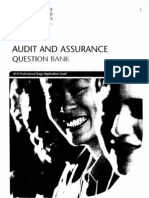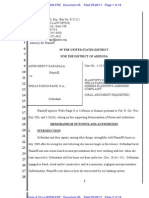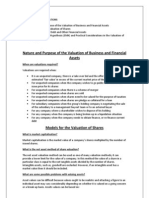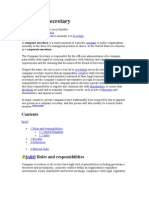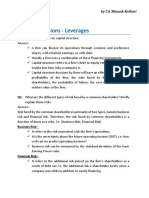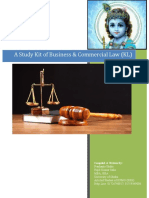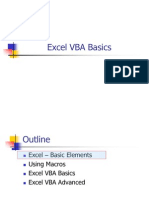Auditing: Lecture # 7
Uploaded by
siddiqueicmaAuditing: Lecture # 7
Uploaded by
siddiqueicmaAUDITING
CONSIDERATION OF LAWS AND REGULATIONS
IN AN AUDIT OF FINANCIAL STATEMENTS (BSA-250)
Lecture # 7
When designing and performing audit procedures and in evaluating and reporting the results
thereof, the auditor should recognize that noncompliance by the entity with laws and regulations
may materially affect the financial statements.
The term noncompliance refers to acts of omission or commission by the entity being audited,
either intentional or unintentional, which are contrary to the prevailing laws or regulations.
Responsibility of Management for the Compliance with Laws and Regulations
It is managements responsibility to ensure that the entitys operations are conducted in accordance
with laws and regulations. The responsibility for the prevention and detection of noncompliance
rests with management.
The following policies and procedures, among others, may assist management in discharging its
responsibilities for the prevention and detection of noncompliance:
Monitoring legal requirements and ensuring that operating procedures are designed to meet
these requirements.
Instituting and operating appropriate internal control.
Developing, publicizing and following a code of conduct.
Ensuring employees are properly trained and understand the code of conduct.
Monitoring compliance with the code of conduct and acting appropriately to discipline
employees who fail to comply with it.
Engaging legal advisors to assist in monitoring legal requirements.
Maintaining a register of significant laws with which the entity has to comply within its
particular industry and a record of complaints.
In larger entities, these policies and procedures may be supplemented by assigning appropriate
responsibilities to the following:
An internal audit function.
An audit committee.
The Auditors Consideration of Compliance with Laws and Regulations
The auditor is not, and cannot be held responsible for preventing noncompliance. In accordance
with ISA 200, Objective and General Principles Governing an Audit of Financial Statements the
auditor should plan and perform the audit with an attitude of professional skepticism recognizing
that the audit may reveal conditions or events that would lead to questioning whether an entity is
complying with laws and regulations.
In order to plan the audit, the auditor should obtain a general understanding of the legal and
regulatory framework applicable to the entity and the industry and how the entity is complying with
that framework.
Md. Mokhlesur Rahman Mozid, ACMA
Audit Procedures when Noncompliance is discovered
When the auditor becomes aware of information concerning a possible instance of noncompliance,
the auditor should obtain an understanding of the nature of the act and the circumstances in which it
has occurred, and sufficient other information to evaluate the possible effect on the financial
statements.
When the auditor believes there may be noncompliance, the auditor should document the findings
and discuss them with management. If management does not provide satisfactory information that
it is in fact incompliance, the auditor would consult with the entitys lawyer about the application of
the laws and regulations to the circumstances and the possible effects on the financial statements.
When adequate information about the suspected noncompliance cannot be obtained, the auditor
should consider the effect of the lack of sufficient appropriate audit evidence on the auditors
report.
Reporting of Noncompliance
The auditor should, as soon as practicable, either communicate with those charged with
governance, or obtain audit evidence that they are appropriately informed, regarding
noncompliance that comes to the auditors attention. However, the auditor need not do so for
matters that are clearly inconsequential or trivial and may reach agreement in advance on the nature
of such matters to be communicated.
If in the auditors judgment the noncompliance is believed to be intentional and material, the
auditor should communicate the finding without delay.
If the auditor suspects that members of senior management, including members of the board of
directors, are involved in noncompliance, the auditor should report the matter to the next higher
level of authority at the entity, if it exists, such as an audit committee or a supervisory board.
Where no higher authority exists, or if the auditor believes that the report may not be acted upon or
is unsure as to the person to whom to report, the auditor would consider seeking legal advice.
To the Users of the Auditors Report on the Financial Statements
If the auditor concludes that the noncompliance has a material effect on the financial statements,
and has not been properly reflected in the financial statements, the auditor should express a
qualified or an adverse opinion.
If the auditor is precluded by the entity from obtaining sufficient appropriate audit evidence to
evaluate whether noncompliance that may be material to the financial statements, has, or is likely to
have, occurred, the auditor should express a qualified opinion or a disclaimer of opinion on the
financial statements on the basis of a limitation on the scope of the audit.
If the auditor is unable to determine whether noncompliance has occurred because of limitations
imposed by the circumstances rather than by the entity, the auditor should consider the effect on the
auditors report.
The following examples Indications that Noncompliance may have occurred of the type of
information that may come to the auditors attention that may indicate that noncompliance with
laws or regulations has occurred are listed below:
Md. Mokhlesur Rahman Mozid, ACMA
Investigation by government departments or payment of fines or penalties.
Payments for unspecified services or loans to consultants, related parties, employees or
government employees.
Sales commissions or agents fees that appear excessive in relation to those ordinarily paid
by the entity or in its industry or to the services actually received.
Purchasing at prices significantly above or below market price.
Unusual payments in cash, purchases in the form of cashiers checks payable to bearer or
transfers to numbered bank accounts.
Unusual transactions with companies registered in tax havens.
Payments for goods or services made other than to the country from which the goods or
services originated.
Payments without proper exchange control documentation.
Existence of an information system which fails, whether by design or by accident, to
provide an adequate audit trail or sufficient evidence.
Unauthorized transactions or improperly recorded transactions.
Media comment.
COMMUNICATION OF AUDIT MATTERS WITH THOSE
CHARGED WITH GOVERNANCE (BSA-260)
The auditor should consider audit matters of governance interest that arise from the audit of the
financial statements and communicate them with those charged with governance. Ordinarily such
matters include the following:
The general approach and overall scope of the audit, including any expected limitations
thereon, or any additional requirements.
The selection of, or changes in, significant accounting policies and practices that have, or
could have, a material effect on the entitys financial statements.
The potential effect on the financial statements of any material risks and exposures, such as
pending litigation, that are required to be disclosed in the financial statements.
Audit adjustments, whether or not recorded by the entity that have, or could have, a material
effect on the entitys financial statements.
Material uncertainties related to events and conditions that may cast significant doubt on the
entitys ability to continue as a going concern.
Disagreements with management about matters that, individually or in aggregate, could be
significant to the entitys financial statements or the auditors report. These communications
include consideration of whether the matter has, or has not, been resolved and the
significance of the matter.
Expected modifications to the auditors report.
Other matters warranting attention by those charged with governance, such as material
weaknesses in internal control, questions regarding management integrity, and fraud
involving management.
Any other matters agreed upon in the terms of the audit engagement.
Md. Mokhlesur Rahman Mozid, ACMA
You might also like
- Audit and Assurance Question and Answers Bank76% (33)Audit and Assurance Question and Answers Bank186 pages
- Opposition To Motion To Dismiss - FILEDNo ratings yetOpposition To Motion To Dismiss - FILED18 pages
- Public Prosecutor V Mohamed Ezam Bin Mohd No0% (1)Public Prosecutor V Mohamed Ezam Bin Mohd No14 pages
- Auditing Ethics: Lecture # 2 Fundamental PrinciplesNo ratings yetAuditing Ethics: Lecture # 2 Fundamental Principles3 pages
- Lecture 1 - Risk and Return (Portfolio Theory)No ratings yetLecture 1 - Risk and Return (Portfolio Theory)13 pages
- Assurance (A Combination Between Manual & Suggested Answers Upto May-June '2019) PDFNo ratings yetAssurance (A Combination Between Manual & Suggested Answers Upto May-June '2019) PDF110 pages
- Case Gilbert Entreprises - Stock Valuation PDFNo ratings yetCase Gilbert Entreprises - Stock Valuation PDF3 pages
- Fair Value Adjustment and Consolidation Adjustment Week 2No ratings yetFair Value Adjustment and Consolidation Adjustment Week 29 pages
- Warf Computers Has Decided To Proceed With The Manufacture andNo ratings yetWarf Computers Has Decided To Proceed With The Manufacture and2 pages
- 1416175152877c Syllab. MBA.1st - Send. Final.3rdNo ratings yet1416175152877c Syllab. MBA.1st - Send. Final.3rd14 pages
- ICAB Knowledge Level Taxation-I Suggested Answer May June 2010 - Nov Dec 201791% (11)ICAB Knowledge Level Taxation-I Suggested Answer May June 2010 - Nov Dec 2017150 pages
- Advanced Accounting Part 2 Business Combinations (Ifrs 3)No ratings yetAdvanced Accounting Part 2 Business Combinations (Ifrs 3)10 pages
- BRPD Circular No. 17 - Loan Classification - 28.09.2020No ratings yetBRPD Circular No. 17 - Loan Classification - 28.09.20202 pages
- 201.06 Accounting For Insurance Companies (IAS-1, IfRS-4)No ratings yet201.06 Accounting For Insurance Companies (IAS-1, IfRS-4)6 pages
- 201.03 Accounting For Joint Ventures, Installment Sales and Consignments (IAS-31), IAS-31 Superseded by IFRS-11& IFRS-12 in 2013No ratings yet201.03 Accounting For Joint Ventures, Installment Sales and Consignments (IAS-31), IAS-31 Superseded by IFRS-11& IFRS-12 in 201311 pages
- Business and Commercial Law by Prashanta & RajibNo ratings yetBusiness and Commercial Law by Prashanta & Rajib46 pages
- Investigation into the Adherence to Corporate Governance in Zimbabwe’s SME SectorFrom EverandInvestigation into the Adherence to Corporate Governance in Zimbabwe’s SME SectorNo ratings yet
- PSA 250 Consideration of Laws and Regulations in An Audit Financial StatementNo ratings yetPSA 250 Consideration of Laws and Regulations in An Audit Financial Statement22 pages
- Case Digest, JD2A, 6. Bataan Cigar Vs CA, 1994No ratings yetCase Digest, JD2A, 6. Bataan Cigar Vs CA, 19942 pages
- Court Ruling On GM's 'Tasteless' Use of Shirtless Albert Einstein in AdNo ratings yetCourt Ruling On GM's 'Tasteless' Use of Shirtless Albert Einstein in Ad16 pages
- Tio v. Videogram Regulatory Board (1987)No ratings yetTio v. Videogram Regulatory Board (1987)1 page
- Undertaking Against Undue Influence BriberyNo ratings yetUndertaking Against Undue Influence Bribery2 pages
- 13-08-25 Order On Use of References To Microsoft v. Motorola FRAND DeterminationNo ratings yet13-08-25 Order On Use of References To Microsoft v. Motorola FRAND Determination11 pages
- Bernina vs. Riddick/Imageline: 081810-17-1No ratings yetBernina vs. Riddick/Imageline: 081810-17-162 pages
- G.R. No. 78239 February 9, 1989 SALVACION A. MONSANTO, Petitioner, Vs - FULGENCIO S. FACTORAN, JR., RespondentNo ratings yetG.R. No. 78239 February 9, 1989 SALVACION A. MONSANTO, Petitioner, Vs - FULGENCIO S. FACTORAN, JR., Respondent4 pages
- Draft of A Sale Deed Submitted By: Aditya Sharma 17010323066 Division B'No ratings yetDraft of A Sale Deed Submitted By: Aditya Sharma 17010323066 Division B'4 pages
- I. General Principles A. Definition and Concept of SuccessionNo ratings yetI. General Principles A. Definition and Concept of Succession14 pages
- Victorias Milling V CA - GR 117356 - 333 SCRA 663No ratings yetVictorias Milling V CA - GR 117356 - 333 SCRA 6638 pages
- DBH 08192010 1-09cv538 Natl Org For Marriage V MckeeNo ratings yetDBH 08192010 1-09cv538 Natl Org For Marriage V Mckee38 pages
